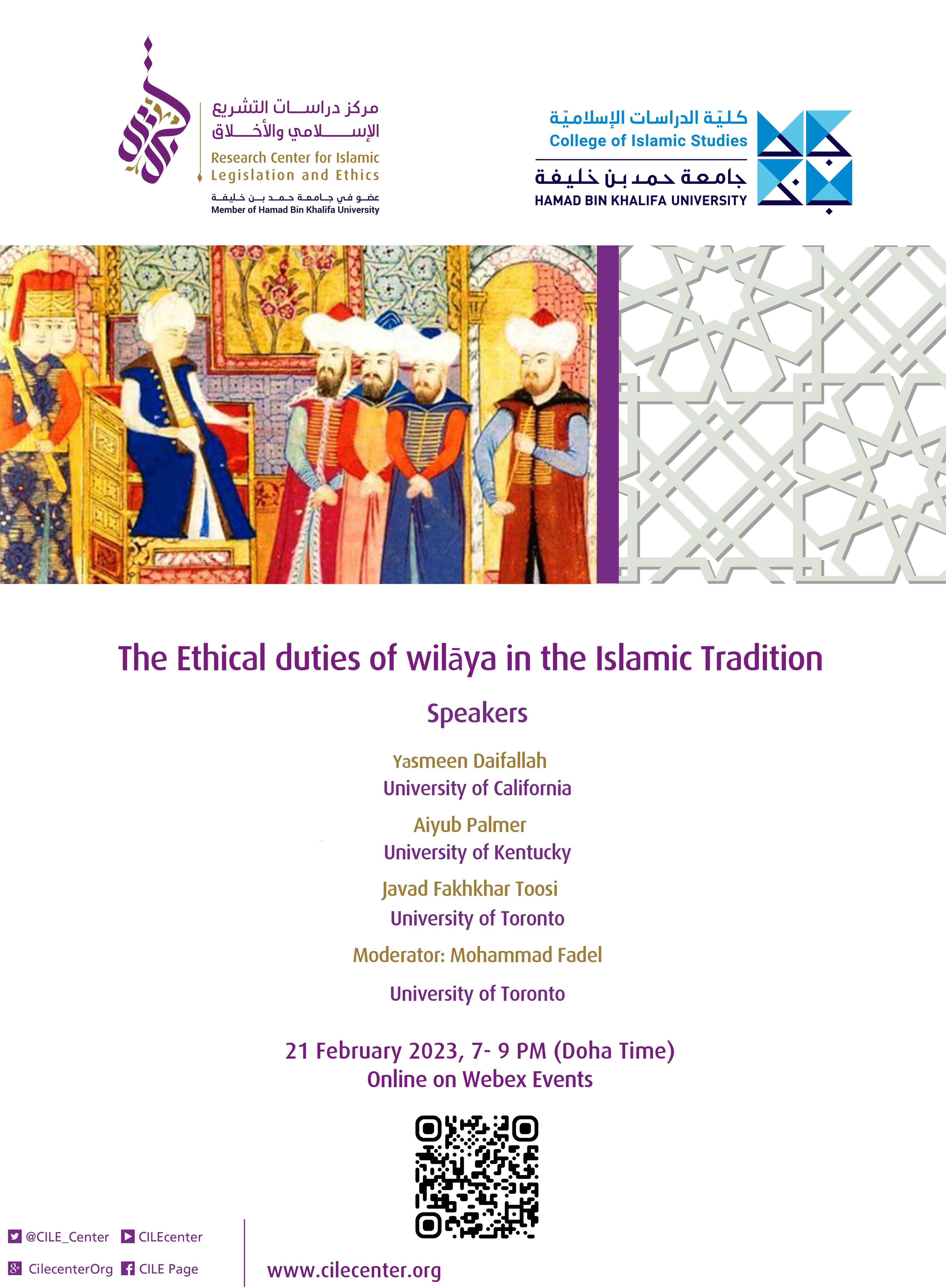
Online Public lecture: The Ethical duties of wilāya in the Islamic Tradition
Abstract
The concept of wilāya is central to the Islamic tradition. It is, simultaneously, a political concept, a legal category, and a spiritual ideal. The three speakers will each address different aspects of the ethical duties that arise out of the concept of wilāya in the Islamic tradition: wilāya as part of the ethical commitments of Islamic political thought; how ethical duties constitute and define the idea of wilāya in the domain of law (fiqh); and wilāya as a kind of ethical practice representing moral aspiration in Sufism
Speakers
- Yasmeen Daifallah, University of California, Santa Cruz
- Aiyub Palmer, University of Kentucky
- Javad Fakhkhar Toosi, University of Toronto
- Mohammad Fadel, University of Toronto (Moderator)
The lecture will be hosted online via Webex on the following link:
shorturl.at/nGKT2
Password: CILE2023
Download Reports
- Report on CILE International Seminar: "The Ethics of Wilāya"
- CILE Public Lecture Report: The ethical duties of wilāya in the Islamic Tradition
|
Public Lecture Tuesday February 21, 2023 |
|
19:00 – 21:00 The ethical duties of wilāya in the Islamic Tradition
|
| Day 1
|
Thursday February 23, 2023
|
|
20:00 - 20:30 |
Opening and Orientation
|
|
20:30 - 21:00 |
The Ethical Turn in Politics and Islamic Conceptions of Wilāya
|
|
21:00 - 21:10 |
Break |
|
21:10 - 22:00 |
Response & Discussion Respondent: Andrew March, UMass-Amherst |
|
22:00-22:10 |
Break |
|
22:10 – 22:40 |
Walāya in Medieval Khurasani Sufism
|
|
22:40 – 23:30 |
Response and Discussion Respondent: Azfar Moin, University of Texas, Austin |
|
23:30- 23:40 |
Break |
|
23:40 – 00:10 |
Wīlaya, Enjoining the Good and Forbidding the Evil and the Quranic Ethic of Gender Reciprocity
|
|
00:10 – 01:00 |
Response and Discussion Respondent: Mohammad Fadel, University of Toronto Faculty of Law |
| Day 2
|
Friday February 24, 2023
|
|
20:00- 20:10 |
Opening
|
|
20:10 – 20:40 |
The Ethicality of Wālī and Wilāya and the Mechanisms Provided in Jurisprudence to Ensure the Observance of Ethics in Wilāya
|
|
20:40 – 21:30 |
Response and Discussion Respondent: Mohammad Fadel, University of Toronto Faculty of Law |
|
21:30-21:40 |
Break |
|
21:40 – 22:10 |
Al-Wilāya in the Political Thought of al-Ghazālī
|
|
22:10 – 23:00 |
Response and Discussion Respondent: Mohammad Fadel, University of Toronto Faculty of Law |
|
23:00-23:10 |
Break |
|
23:10 – 23:40 |
Grounding Sufi wilāya in Islamicate Authority, al-Ḥakīm al-Tirmidhī’s Solution to the Problem of Power
|
|
23:40 – 00:30 |
Response and Discussion Respondent: Ovamir Anjum, University of Toledo |
|
00:30 - 01:00 |
Concluding Remarks and Publication Plan |
The Research Center for Islamic Legislation and Ethics (CILE)
Islamic Ethics is one of the emerging scholarly fields with promising growth potential in academic research and with great appeal among the general public. The Research Center for Islamic Legislation and Ethics (CILE) has been contributing to this emerging field in various ways. Besides organizing international conferences and research seminars, CILE also contributes to the field through pioneer academic initiatives. In collaboration with the world renowned publisher Brill, CILE established the Journal of Islamic Ethics, indexed by Scopus, and the book series Studies in Islamic Ethics. Additionally, the first-of-its-kind M.A. program “Applied Islamic Ethics” was established in the 2019-2020 academic year, through the College of Islamic Studies at Hamad Bin Khalifa University, with which CILE is affiliated. The program addresses how Islam, as a world religion with a rich moral tradition, engages with and contributes to the global moral discourse. Its strong interdisciplinary character combines in-depth knowledge of both theoretical and applied ethics rooted in the Islamic moral tradition.
Opening Remarks:
Recep Şentürk (Dean of the College of Islamic Studies)
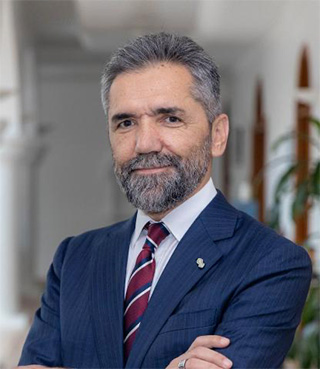
Dr. Recep Şentürk is the Dean of the College of Islamic Studies at HBKU. He was the former Founding President of Ibn Haldun University in Istanbul (2017–2021). Dr. Şentürk holds a PhD from Columbia University’s Department of Sociology, and specializes in Civilization Studies, Sociology, and Islamic Studies with a focus on social networks, human rights, and modernization in the Muslim world. He served as a researcher at the Center for Islamic Studies (İSAM) in Istanbul, and as Founding Director of the Alliance of Civilizations Institute. He is Head of the International Ibn Khaldun Society, and has a seat on the editorial boards of multiple academic journals. Among his books are, in English: Narrative Social Structure: Hadith Transmission Network 610-1505; and in Turkish: Open Civilization: Towards a MultiCivilizational Society and World; Ibn Khaldun: Contemporary Readings; Malcolm X: Struggle for Human Rights; and Social Memory: Hadith Transmission Network 610- 1505. Dr. Şentürk’s work has been translated to Arabic, Japanese, and Spanish.
Mohammad Fadel (University of Toronto)
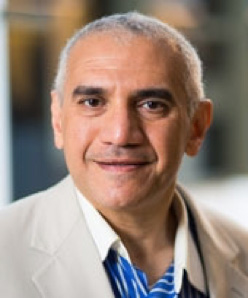
Mohammad H. Fadel is a Full Professor at the Faculty of Law, which he joined in January 2006. Professor Fadel wrote his Ph.D. dissertation on legal process in medieval Islamic law while at the University of Chicago and received his JD from the University of Virginia School of Law. Professor Fadel was admitted to the Bar of New York in 2000 and practiced law with the firm of Sullivan & Cromwell LLP in New York, New York, where he worked on a wide variety of corporate finance transactions and securities-related regulatory investigations. Professor Fadel also served as a law clerk to the Honorable Paul V. Niemeyer of the United States Court of Appeals for the 4th Circuit and the Honorable Anthony A. Alaimo of the United States District Court for the Southern District of Georgia. Professor Fadel has published numerous articles in Islamic legal history and Islam and liberalism.
Mohammad Ghaly (CILE Acting Director)

Dr. Mohammed Ghaly is professor of Islam and Biomedical Ethics at the Research Center for Islamic Legislation & Ethics (CILE) at Hamad Bin Khalifa University in Doha, Qatar. He has a B.A. degree in Islamic Studies from Al-Azhar University (Egypt) and M.A. and PhD degrees in the same specialization from Leiden University (the Netherlands). During the period 2007-2013, Ghaly was a faculty member at Leiden University.
The intersection of Islamic Ethics and biomedical sciences is Ghaly’s main specialization. He is the editor-in-chief of the Journal of Islamic Ethics (published by Brill). Since 2011, Ghaly has been a faculty member at the Erasmus Mundus Program; the European Master of Bioethics, jointly organized by a number of European universities. Ghaly lectured on Islamic (bio)ethics at many universities worldwide including Imperial College London, Oxford University, University of Oslo, University of Chicago, and Georgetown University.
Ghaly was affiliated as Visiting Scholar/Researcher with a number of universities including the Kennedy Institute of Ethics at Georgetown University, USA (academic year 2014-2015), School of Anthropology and Museum Ethnography at the University of Oxford (academic year 2017- 2018) and School of Philosophy at the Erasmus University Rotterdam (academic year 2018- 2019).
Besides his book Islam and Disability: Perspectives in Theology and Jurisprudence (Routledge, 2010) and the edited volumes Islamic Perspectives on the Principles of Biomedical Ethics (Imperial College & World Scientific, 2016) and Islamic Ethics and the Genome Question (Brill, 2019), Ghaly is the single author of more than thirty peer-reviewed publications and serves on the editorial board of a number of academic journals. He is also the Lead Principal Investigator (LPI) and research consultant of a number of funded research projects. His publications can be accessed via https://cilecenter.academia.edu/MohammedGhaly.
Presenters and Respondents:
The Ethical Turn in Politics and Islamic Conceptions of Wilāya
Speaker: Yasmeen Daifallah, University of California, Santa Cruz
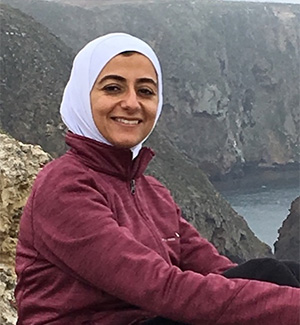
I am an Assistant Professor of Politics at the University of California, Santa Cruz. My research is primarily concerned with exploring the critical potential of postcolonial political theory. The archive I have been working with for the past few years is that of contemporary Arab thought, with a specific focus on broad-ranging philosophical projects aiming at the reinterpretation of the Islamic tradition in the 1970s-1990s. I examine these projects as sites of conceptual and interpretive strategies that aim to transform their readers’ understanding of their social and political reality by offering a critique of current dispositions towards politics, and a set of resources for crafting alternative political visions. I am currently finishing a book manuscript on this topic entitled Theorize and Decolonize: The Political Subject in Contemporary Arab Thought. In the past, I have written about decolonial interpretation in Arab political thought (Daifallah 2019), modern(ist) conceptions of al-turath al-‘arabi al-islamiyy as a mode of critique in contemporary Islamic thought (Daifallah 2019), as well as the use of the Marxist (Daifallah 2017) and phenomenological (Daifallah 2017) philosophical traditions to launch critical projects by contemporary Arab thinkers.
Abstract:
By some accounts, contemporary political theory has recently taken an “ethical turn” (Garber and Walkowitz 2000: Myers 2013). Contrary to what the expression “ethical turn” suggests, its theorists are less concerned with analyzing or formulating a set of norms that should guide individual and collective life à la moral philosophy or normative political theory. Rather, their positions range from alarm at the recent widespread of a politics of moralism in established democracies (Rancière 2006), to those who try to carve out liberatory spaces, however limited, away from the heightened unfreedom of late modern politics, rife as these have become with regimes of surveillance, discipline, and the biopolitical regulation of modern populations to name a few of Foucault’s well-known critiques of modern power (Foucault 2001). The ethical turn signals, in part, a disillusionment with modern politics, and a search for a modicum of freedom through “caring for the self” (Foucault 1997), “giving an account” of the conditions that form that self (Butler 2005), including getting to know and reckon with the fears, prejudices, and disgust that “the Other” may provoke in us (Connolly 1999: Butler 2005). With better self-knowledge, it is hoped, the self has greater chances at founding a politics informed by a genuinely democratic ethos. The underlying assumption here is that ethical self-development precedes the formation of a just politics. But how, one might ask, could the former be cultivated without the latter? How, that is, could a polity (or a community) provide room and readiness for ethical education within a context that operates according to different, if not hostile, set of norms (say those of power politics, instrumental reason, or an intolerant moralism)? Is it possible to envision a politics that considers ethical cultivation as one of its key conditions? In my contribution, I would like to examine how the multiple meanings and registers of the concept of wilāya could serve as a critical resource for envisioning such a politics.
The workshop invitation gives us some leads. It prompts us, for example, to consider the various senses of wilāya: its semantic range which expands to cover practices of solidarity, mutual aid and care, moral-legal responsibility as well as those of authority, all of which come to life in the Qur’anic uses of the root w-l-y and its multiple valences in the legal and mystical traditions. On the abstract level, connection between these valences could be readily made. If, for instance, we put together the linguistic resonances of wilāya (implying support and mutual help, as well as being in charge of a range of affairs- waly’ al-amr, waliyy al-yatīm, waliyy al-nikāḥ, etc.) with their scriptural references, implying God’s support of those who believe, and the solidarity between believers, along with the legal-political implication of a contractual relationship between an agent (wakīl) and a principle (muwakkil) in line with what Fadel (2017) invites us to consider, we find that all these senses of wilaya share three fundamental features: a) relationality: that whether exercised horizontally (amongst a community of believers) or vertically (between God and believers, orphans and their care-takers, the Muslim community and its ruler(s), etc.), wilāya is a concept that has a decisively relational quality, b) the significance of the moral and affective dimensions of, wilāya. This component seems to gel the various senses of wilāya together: God’s relationship to believers, the believers’ connections to one another, relationships of custodianship and authority that bind certain individuals (orphans, women, etc.) or groups (the Muslim community, however defined) together are all properly ones of wilāya far as they meet criteria of care, support, solidarity, mutual aid, as well as those of agency and management of affairs. Finally, c) when put together, these meanings have a complementary quality: a society of believers who enjoy and enjoin wilāya such that they become “ba‘ḍuhum awliya’u ba‘ḑ” would presumably summon God’s wilāya (allahu waliyyu al-lathīna āmanū). Such divine wilāya would then extend to the waliyy al-amr (the imams, judges, governors, representative bodies, etc.) insofar as these are legitimate according to a set of well-defined legal parameters (Fadel 2017, 52).
This, of course, is an idealized picture where wilāya, an ethical-legal-affective norm, is practiced to its fullest by all parties involved. I formulate it as such to underline some preliminary resonances between its semantic, scriptural, and legal senses, but also, and more significantly, to provoke pause and reflection. What, I’d like to ask, are the conditions for cultivating the moral-affective sensibilities for a political subject capable of wilāya? What are the intellectual, psychic, emotive dispositions required for fashioning a political subject with a socio-ethical taste for mutual counsel, solidarity, and the legitimate exercise of authority? Courtesy of the above-mentioned “ethical turn,” political theory’s position on the formation of ethical subjectivity had recoiled from considering it an end to be sought in and through collective life to one that is largely solitary, or occurring within small enclaves of self-caring, Other-conscious individuals. Instead, I suggest that wilāya’s complementary resonances invite us to put politics, ethics, and affect in conversation to consider the possibilities that a “political subject of wilāya” could open for thinking about collective life. The archive I intend to use to explore these questions is the writings of Taha Abdurrahman (b. 1944). I choose Abdurrahman because he is one of the few contemporary philosophers who have put considerable intellectual effort into examining the relationship between ethics and politics, and the premises for cultivating an ethical-political sensibility informed by Islamic doctrine and tradition. In doing so, I focus less on interpreting Abdurrahman’s oeuvre in its totality, and more on bringing that oeuvre to bear on the wilāya-related questions I pose above.
Respondent: Andrew March, UMass-Amherst

My research and teaching interests are in the areas of political philosophy, Islamic law and political thought, religion and political theory, and comparative and non-Western political theory more generally. My first book, Islam and Liberal Citizenship: The Search for an Overlapping Consensus (Oxford, 2009) is an exploration of the Islamic juridical discourse on the rights, loyalties, and obligations of Muslim minorities in liberal politics, and won the 2009 Award for Excellence in the Study of Religion from the American Academy of Religion. My second book, The Caliphate of Man: The Invention of Popular Sovereignty in Modern Islamic Thought (Harvard, 2019, forthcoming), examines the problem of divine and popular sovereignty in modern Islamic thought through the Arab Spring. I have published articles on Islamic law and political thought, secularism, religion and free speech, religious freedom and the boundaries of marriage in liberal society, all of which can be found here.
Walāya in Medieval Khurasani Sufism
Speaker: Jason Welle, Pontifical Institute for Arabic and Islamic Studies, Rome
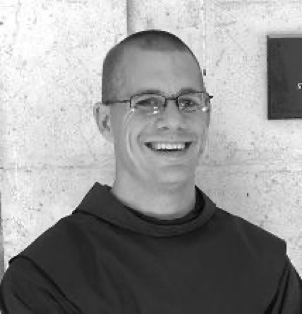
Jason Welle is associate professor and former Director of Studies at the Pontifical Institute for Arabic and Islamic Studies in Rome. He holds a Ph.D. in Theological and Religious Studies from Georgetown University and masters degrees from the Catholic Theological Union and the University of Notre Dame. His research interests focus on Islamic mysticism, particularly in the formative period, on Muslim-Christian relations, particularly in the Middle Ages, and in the Franciscan intellectual tradition. He has co-edited two books on the legacy of the Second Vatican Council and authored more than a dozen scholarly articles or book chapters, mainly on topics related to Sufism or Muslim-Christian dialogue. He is currently preparing a monograph on Abū ʿAbd al-Raḥmān al-Sulamī, the center of his doctoral research, and, together with co-translator Safaruk Chowdhury, awaits the publication of a collection of al-Sulamī’s translated treatises (Islamic Texts Society, forthcoming in 2022).
Abstract:
This paper will explore walāya in the writings of key Ṣūfī texts in Khurasan in the 4th/10th and 5th/11th centuries, with an eye to social relationships among those who embrace the Ṣūfī path. Scholars of Sufism agree that the “friends of God” wield spiritual sovereignty over the world, and the paper tries to search out – insofar as this is possible – the relationship between this general claim about spiritual sovereignty and the particular exercise of authority that Ṣūfī masters possess vis-à-vis their disciples and their companions. In terms of the sources analyzed, the paper builds a bridge from al-Ḥakīm al-Tirmidhī to al-Qushayrī by analyzing the contributions of intervening figures to whom contemporary scholars have devoted less attention. Aiyub Palmer made a significant intervention with Sainthood and Authority in Early Islam (Brill, 2020), but an under-developed element of Palmer’s monograph was the reception (or non-reception) of the Tranoxanian al-Ḥakīm al-Tirmidhī’s novel concept of walāya by significant figures in Khurasan in the succeeding generations. The approach to walāya taken by Abū ʿAbd al-Raḥmān al-Sulamī (d. 412/1021), already discussed in broad strokes by Jean-Jacques Thibon and Safaruk Chowdhury, serves as the main point of departure in the paper, but the published version will analyze and synthesize additional sources from the period, including the anonymous 4th/10th century Kitāb ʿilm al-taṣawwuf (Iranian Institute of Philosophy, 2011) and The Comfort of the Mystics (Brill, 2013) by Abū Khalaf al-Ṭabarī (d. ca. 470/1077). These will provide a fuller picture of the way Ṣūfī masters in the formative period conceived authority and sainthood, thus placing the widely-diffused and much-discussed Risāla of al-Qushayrī in its proper context and identifying more clearly how al-Qushayrī reshaped the thought of his predecessors. Beyond this basic historical question about how the concept of walāya evolved in taṣawwuf in the period, the longer version of the paper for publication will attempt a more theoretical intervention by probing the question of virtue ethics in relationship to walāya. The present author has argued that scholars of Sufism would do well to attend to the revival of interest in virtue ethics due to the fundamental coherence of that stream of thought with the giants of early taṣawwuf, even when these giants did not show the direct influence of Greek philosophy. The paper thus posits not merely that the exercise of walāya by Ṣūfī masters should be placed within a framework of virtue ethics but attempts to articulate more precisely the concept of virtue and the type of virtue ethics at play in the period.
Respondent: Azfar Moin, University of Texas, Austin
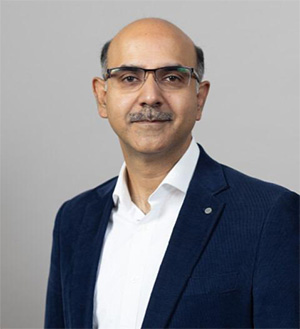
Dr. A. Azfar Moin studies the early modern Islamic world from comparative perspectives with a focus on concepts and practices of sovereignty. His book The Millennial Sovereign: Sacred Kingship and Sainthood in Islam (Columbia University Press, 2012) won the Best First Book in the History of Religions Award from the American Academy of Religion, John F. Richards Prize in South Asian History from the American Historical Association, and Honorable Mention for the Bernard S. Cohn Book Prize (South Asia) from the Association for Asian Studies.
He co-edited with Dr. Alan Strathern an interdisciplinary volume of essays, Sacred Kingship in World History: Between Immanence and Transcendence (Columbia University Press, 2022). In 2022, Dr. Moin also guest-edited a special issue of the journal Modern Asian Studies on "Sulh-i Kull as an Oath of Peace: Mughal Political Theology in History, Theory, and Comparison."
Dr. Moin's research has been supported by grants from the Postdoctoral Fellowship for Transregional Research from the Social Science Research Council and a Charles A. Ryskamp Research Fellowship from the American Council of Learned Societies. He teaches courses on religious transformations in the early modern Islamic world, rituals and practice of sovereignty in Islam, and theory and method in the study of religion.
He currently serves as a co-editor for Modern Asian Studies, published by Cambridge University Press.
Wīlaya, Enjoining the Good and Forbidding the Evil and the Quranic Ethic of Gender Reciprocity
Speaker: F. Redhwan Karim, Markfield Institute Higher Education
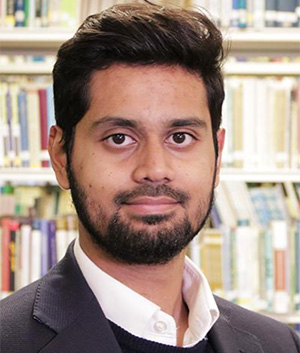
Dr. F. Redhwan Karim is a Lecturer in Islamic Studies at the Markfield Institute of Higher Education and course leader for the B.A Islamic Studies program. He completed his Ph.D at SOAS, University of London, where his thesis examined the concept of gender relations in the Qur’an. Prior to this, he obtained an M.A in Islamic Studies and a B.A in Arabic and Islamic Studies. He has also studied at various capacities in Egypt, Jordan, Oman and Bosnia. Dr F. Redhwan Karim is a Fellow of the Higher Education Academy, U.K. His recent publication includes: Karim, F. Redhwan. "Rethinking Women's Dress Prescriptions in the Qur'ān: An Intratextual Reading of Zīna." Journal of Islamic and Muslim Studies, vol. 6 no. 2, 2022, p. 82-112. He has upcoming journal articles on symbolism in the Sīra, and Arabic codicology, and an edited volume on the history of the Qur’ān.
Abstract:
Q. 4:34 is often quoted as the regulating verse that details the relationship between men and women. The key phrase of men having qawama over women is used to underscore this conclusion. Pre-modern legal discourse also sees a close relationship between the notion of qawama and wilāya, where women need a guardian (walī) to administer her affairs. However, what is almost always overlooked is that the Qur’ān already maintains, what we argue, the normative relationship between men and women in Q. 9:71: “The believers, both men and women (al-mu’minūna wa al-mu’minātu), support each other (baʿḍuhum ‘awliyā’u baʿḍin); they order what is right and forbid what is wrong (ya’murūna bi’l-maʿrūfi wa yanhawna ʿan al-munkar); they keep up the prayer and pay the prescribed alms; they obey God and His Messenger. God will give His mercy to such people: God is almighty and wise.”
What is striking about this verse is that it explicitly upholds and uses the term wilāya to underscore the relationship between men and women. In contrast to Q. 4:34, it does not envision any hierarchy but envisions a more reciprocal relationship. Muslim men and women are awliyā of each other, and they ‘order what is right and forbid what is wrong’. In this paper, we argue that Q. 9:71 should be privileged as the normative verse concerning the relationship between men and women. We look at the context and linguistic implications of the Q. 9:71 and compare this with Q. 4:34 to show how the latter is self-limiting while the former is generic and broad. Q. 4:34, for example, deals explicitly with the dynamic of marriage. Q. 9:71, on the other hand, details no such limitations.
The paper also draws upon another critical aspect of Q. 9:71, which underscores the duty of ʿamr bi’l maʿrūf wa nahi ʿan al-munkar as being the incumbent on both men and women. Jurists almost unanimously saw this duty as underscoring clear contours of sociopolitical participation. Certain scholarly currents, for example, saw this as the legitimisation of political rebellion against authoritarian leadership, while others at a lesser level saw this as speaking out against those in power. However, what is clear is that this duty is seen as a generic duty to the world at large (Cook 2001; El Fadl 2001). However, in a contradictory fashion, this duty of ʿamr bi’l maʿrūf is often restricted in this verse as only being only applicable to men. Many exegetes would gloss over the significance of this reciprocity in favour of the latter part, which speaks of prayer and alms, and interpret the verse as being restricted for women to the eschatological consequences of the hereafter (Lamrabet 2015; Lamrabet 2017). This paper argues against this reading and underscores the importance and legitimacy of a more expansive reading for women. In doing so, we highlight pre-modern and modern exegesis that also upholds this reciprocal duty. Ibn Kathīr, for example, links the use of ʿamr bi’l maʿrūf in Q. 9:71 with Q. 3:104 and concedes that women alongside men are indeed included in this categorisation. Rashīd Riḍa, in the modern period, also makes this point more strongly. In doing so, this paper argues how the normative relationship between men and women, as depicted in the Qur’ān, should be framed in terms of wilāya and reciprocity.
Respondent: Mohammad Fadel, University of Toronto Faculty of Law

Mohammad H. Fadel is a Full Professor at the Faculty of Law, which he joined in January 2006. Professor Fadel wrote his Ph.D. dissertation on legal process in medieval Islamic law while at the University of Chicago and received his JD from the University of Virginia School of Law. Professor Fadel was admitted to the Bar of New York in 2000 and practiced law with the firm of Sullivan & Cromwell LLP in New York, New York, where he worked on a wide variety of corporate finance transactions and securities-related regulatory investigations. Professor Fadel also served as a law clerk to the Honorable Paul V. Niemeyer of the United States Court of Appeals for the 4th Circuit and the Honorable Anthony A. Alaimo of the United States District Court for the Southern District of Georgia. Professor Fadel has published numerous articles in Islamic legal history and Islam and liberalism.
Day 2: Friday February 24, 2023
The Ethicality of Wālī and Wilāya and the Mechanisms Provided in Jurisprudence to Ensure the Observance of Ethics in Wilāya
Speaker: Javad Fakhkhar Toosi, University of Toronto

I studied Arabic literature, logic, the principles of jurisprudence (uṣūl al-fiqh), Islamic philosophy and mysticism, Shia and Sunni jurisprudence theology, interpretation of the Qur’an (tafsīr), and the sciences of ḥadīth in the seminary of Qom, the highest center of Shīʿī Islamic sciences. My education provided me with opportunities to discuss and present theories in various fields of Islamic studies.
Simultaneously, I pursued academic studies in a secular context, receiving my master’s degree in Islamic philosophy and theology from the University of Qom and my doctorate in Islamic education and ethics from the University of Malaya in Kuala Lumpur, Malaysia, with distinction.
I have taught at various seminaries and universities since 1991. My teaching during these years included several fields of Islamic sciences. I was the master of students and teaching for over 19 years. I am currently a visiting professor at the department of Historical studies of the University of Toronto, from May 2022 to May 2023, and a senior research fellow at the Qur’an and Ḥadīth Department of the Fahim Research Institute.
Abstract:
Some jurisprudential sources such as al-Aḥkām al-sulṭānīyya by al-Farrāʾ and al-Māwardī and al-Imāma wa al-Sīyāsa by ibn Qutayba, al-Ḥisba by ibn Taymīyya, Maʿālim al-qurba fī Aḥkām al-ḥisba by ibn Ikhwa, and Maʾāthir al-ināfa fī Maʿālim al-khilāfa by al-Qalaqshandī deal with “the duties of rulers and government agents”, but not from an ethical perspective. Although a few sources like al-Taratīb al-Idārīyya by Al-Kattānī and Dirāsāt fī fiqh al-Dawlah al-Islāmīyah by Hussein-Ali Montazeri look at “the ruler’s ethics” (sīrat al-Imām wa akhlāquh), they generally focus on his personal ethical qualities. This article discusses “the ethics of wālī and political wilāya” as well as the mechanisms provided in jurisprudence to ensure the observance of ethics in governments and by rulers.
According to Muṣṭafawī, the great lexicographer, the essential aspect of wilāya is “the proximity of walī to that which is under his jurisdiction (muwallá ʿalayh) with a relationship between the two”. As a result, wilāya gains a moral component that distinguishes it from other terms (such as al-ḥukm, al-dawla, al-riʾāsa, etc.).
The first part of the article discusses the definition of “ethical walī and wilāya” (al-walī al-Akhlāqī wa al-Wilāya al-Akhlāqīya), which is equivalent to the definition provided by jurists for “just walī and wilāya” (al-walī al-ʿādil wa al-wilāya al-ʿādila). The article will highlight the distinction between “individual justice” (al-ʿidāla al-fardīya) and “governmental justice” (al-ʿidāla al-ḥukūmīyya). In the field of governance (wilāya), “immorality” refers to the walī’s failure to manage the affairs of that which is within his jurisdiction. The article will provide three examples of this: 1) disregard for the interests of the person under his jurisdiction (muwallá alayh); 2) weakness in managing that person’s affairs; and 3) tyranny and following his personal desires in managing those affairs.
The second part of this article is devoted to the mechanisms which we have extracted from juristic sources to ensure the “ethicality in wilāya”: 1) “advice for the Muslims’ imams” (al-naṣīḥa li-aʾimmat al-muslimīn): advising signifies benevolence regarding walī’s benefits in this world and the next. The title encompasses criticism of walī‘s unethical actions; 2) “disobeying the ruler’s anti-Sharīʿah and anti-moral instructions”. This article refers to the Qur’anic evidence and ḥadīth to support this claim. The article also scrutinizes the traditions that seem to suggest compliance as unavoidable, even when, based on Sharīʿah, the walī’s directives are immoral; and 3) “constant monitoring and control of citizens”: This monitoring takes the form of “enjoining (what is) good and forbidding what is wrong” (the Holy Qur’an, 3:104). The article will answer the essential question: “to what extent the scope of this monitoring is”. The importance of these mechanisms in ensuring the “ethicality of wilāya” is emphasized, as well as the impact of the theological ideas of different schools of thought about wilāya on these mechanisms.
The article follows a “comparative method” between the five schools of Islamic jurisprudence (Ḥanbalī, Mālikī, Shāfiʿī, Ḥanafī, and the Twelver Shiites), and the research sources are the classical juristic books of these schools.
The article concludes that in Islamic jurisprudence, wilāya is integrated with morality. This integration is sought both as a starting point and as a continuation. As a result, some mechanisms have been devised to assure continuity.
Respondent: Mohammad Fadel, University of Toronto Faculty of Law

Mohammad H. Fadel is a Full Professor at the Faculty of Law, which he joined in January 2006. Professor Fadel wrote his Ph.D. dissertation on legal process in medieval Islamic law while at the University of Chicago and received his JD from the University of Virginia School of Law. Professor Fadel was admitted to the Bar of New York in 2000 and practiced law with the firm of Sullivan & Cromwell LLP in New York, New York, where he worked on a wide variety of corporate finance transactions and securities-related regulatory investigations. Professor Fadel also served as a law clerk to the Honorable Paul V. Niemeyer of the United States Court of Appeals for the 4th Circuit and the Honorable Anthony A. Alaimo of the United States District Court for the Southern District of Georgia. Professor Fadel has published numerous articles in Islamic legal history and Islam and liberalism.
Al-Wilāya in the Political Thought of al-Ghazālī
Speaker: Vanessa Breidy
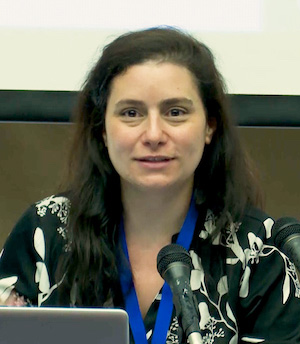
Vanessa Breidy is a Doctoral candidate in Arabic and Islamic Studies at the Pontifical Institute for Arabic and Islamic Studies (PISAI, Rome) and in Political Sciences at Istituto Universitario Sophia (IUS, Florence) entitled ‘From Knowledge to Political Authority. The case of al-Ġazālī and Thomas Aquinas’. In 2019, she completed a certificate in Islamic Studies (level 1 and level 2) from PISAI, Rome with distinction (Summa Cum Laude). In 2014, she completed a master’s degree, with distinction (con Lode), in Foundations and Perspectives for a culture of unity – Political Studies from Istituto Universitario Sophia, Incisa Val d’Arno Florence, Italy. Since 2017, Ms. Breidy also serves as a member of the Beirut Bar Association.
Abstract:
Al-Ġazālī’s politics have been studied by many scholars using different methodologies to understand his political texts spread in many of his books such as Iḥyā’ ‘ulūm al-dīn, Naṣīḥat almulūk and al-Iqtiṣād fī al-i‘tiqād. From these scholars we can name Henri Laoust, Leonard Binder, Ann Lambton, Carole Hillenbrand, Omid Safi, Patricia Crone, Aziz Azmeh and Yazeed Said.
However, al-Ġazālī’s conception of politics has been usually studied without undertaking a holistic study of his view of the world, of the truth and the ways to arrive to it. This problematic has been very well highlighted by Yazeed Said, in Ghazālī’s politics in context, Routledge, NY, 2013.
What I would like to build in this paper is a holistic way of understanding the political authority or wilāya in al-Ġazālī, which cannot be perceived and exercised outside the frame of al-ḥaqq and living according to it. In order to reach the ways of al-ḥaqq, certain knowledge is required. AlĠazālī eagerly searched to find and formulate a knowledge path or system that might permit to reach yaqīn (certainty). In fact, he revisited the different ways of searching the truth that were present in his time and were challenging each other, such as ‘ilm al-kalām, al-falsafa, alta‘līmiyya and Sufism, which helped him to cleanse and reorganize in his ‘heart’ the value of each way and science and the limits of its reach.
The knowledge system that al-Ġazālī has built is the basis of the ethics that should (or would systematically) be reflected into the acts of the Muslim.
وعنه صلى الله عليه وسلم: "لا يكون المرء عالما حتى يكون بعلمه عاملا"
The meaning and purpose of life that becomes clearer when undertaking the path of knowledge would automatically be reflected in politics; at the end, what is the purpose of a Muslim society if it is not to help its individuals to reach happiness?
"أن مقاصد الخلق مجموعة في الدين والدنيا ولا نظام للدين إلا بنظام الدنيا، فإن الدنيا مزرعة الآخرة لمن يتخذها مستقرا ووطنا، وليس ينتظم أمر الدنيا إلا بأعمال الآدميين."
In the first part of Naṣīḥat al-mulūk, which authentic attribution to al-Ġazālī has never been seriously questioned (unlike its second part), he says:
"أيها السلطان! خطر الولاية عظيم، وخطبها جسيم، والشرح في ذلك طويل، ولا يسلم الوالي إلا بمقاربة علماء الدين ليعلموه طرق العدل ويسهلوا عليه خطر هذا الأمر."
Thinking al-wilāya in al-Ġazālī’s thought without taking into account his knowledge system would most probably lead to distortions in understanding his political texts. Reading al-Ġazālī holistically render his teachings valuable also for today’s world in the search for renewing ethics and political theories.
Abū Ḥāmid al- Ġazālī, Iḥyā’ ‘ulūm al-dīn, Dār Ibn Ḥazm, Beirut, 2005.
Ahmad Shams al-Din (trans.), Abū Ḥāmid al-Ġazālī, al-tabr al-masbūk fī naṣīḥat al-mulūk, Dār al-kutub al-‘ilmiyya, Beirut, 1988
Respondent: Mohammad Fadel, University of Toronto Faculty of Law

Mohammad H. Fadel is a Full Professor at the Faculty of Law, which he joined in January 2006. Professor Fadel wrote his Ph.D. dissertation on legal process in medieval Islamic law while at the University of Chicago and received his JD from the University of Virginia School of Law. Professor Fadel was admitted to the Bar of New York in 2000 and practiced law with the firm of Sullivan & Cromwell LLP in New York, New York, where he worked on a wide variety of corporate finance transactions and securities-related regulatory investigations. Professor Fadel also served as a law clerk to the Honorable Paul V. Niemeyer of the United States Court of Appeals for the 4th Circuit and the Honorable Anthony A. Alaimo of the United States District Court for the Southern District of Georgia. Professor Fadel has published numerous articles in Islamic legal history and Islam and liberalism.
Grounding Sufi wilāya in Islamicate Authority, al-Ḥakīm al-Tirmidhī’s Solution to the Problem of Power
Speaker: Aiyub Palmer, University of Kentucky
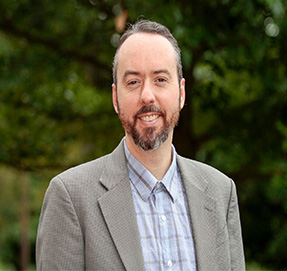
Aiyub Palmer is an associate professor of Arabic and Islamic Studies at the University of Kentucky. His focus of research is on Sufism and particularly sainthood and authority in early Islam. Palmer’s monograph published by Brill in 2019 is titled Sainthood and Authority in Early Islam, al-Ḥakīm al-Tirmidhī’s Theory of wilāya and the Reinvisioning of the Sunnī Caliphate. In December 2021, Palmer presented a paper at INALCO (Institut national des langues et civilisations orientales) in Paris, France titled “Towards a Wilāya-Walāya model as a Social Basis for the Master-Disciple Relationship in al-Sulamī’s Mujālasat al-Mashāyikh.” The colloquium, organized by CERMOM (Research Center for the Middle East and the Mediterranean) on a by-invitation basis, will publish its proceedings in May of 2023. In January of 2019, Palmer’s article “Revisiting the seal-structure of walāya in Ibn al-ʿArabī’s Fuṣūṣ al-ḥikam” was published in Brill’s Journal of Sufi Studies, discussing the important relationship between al-Tirmidhī’s concept of wilāya and the notion of walāya formulated by Ibn al-ʿArabī. In March of 2020, Palmer’s chapter titled “Sufism and Hadith” was published in The Wiley Blackwell Concise Companion to the Hadith. In this chapter he demonstrated the important place of Hadith in Sufi discourse, highlighting the way in which Hadith study and dissemination influenced the way Sufis positioned themselves as masters of their own discipline. In April of 2019, Brill published Palmer’s encyclopedia entry “Maʿrūf Karkhi” in the Encyclopedia of Islam III and in March of 2022 the entry “ ͑Aql in Sufism” was published in the same encyclopedia. Palmer is currently working on a translation of al-Ḥakīm al-Tirmidhī’s Kitāb al-ḥikma for Gorgias Press.
The study of Islamic sainthood prior to the groundbreaking work of Vincent Cornell in his book Realm of the Saint, focused on an interpretation of the Arabic word w*lāya as following the voweling pattern walāya. This interpretation led experts on Islamic mysticism to interpret the awliyāʾ Allāh as the “friends of God.” Cornell shifted this discourse by insisting that wilāya was also an important factor in interpreting the function and role of the awliyāʾ in Islamicate cultures and society. While Cornell focused on the study of the awliyāʾ in maghribī Sufism, Palmer extended this important contribution by applying a similar lens to early Sufism during the 3rd and 4th centuries AH, concentrating on the works of al-Ḥakīm al-Tirmidhī and his notion of authority as an expression of both wilāya and walāya.
Abstract:
In Sufi nomenclature wilāya connotes not only the power to protect others who enter into a special pact of allegiance, but also, in a spiritual sense, the jurisdiction that a walī Allāh is bequeathed by God to exercise over a particular area of the earth. Given the juridical and theological framework at play in the use of this term, the question remains as to how closely the term wilāya in its Sufi context is connected to the semantic field of terms we use in English like authority and power. This paper seeks to ground Sufi wilāya within that semantic field of philosophical discourse that juxtaposes authority to power. To this extent, the paper will use the work of Alexandre Kojève in his La notion de l’autorite, which expounds upon four ideal types of authority and uses the “authority problem” as a foil for Hegel’s master-slave dialectic. The paper demonstrates that al-Ḥakīm al-Tirmidhī is not only the first Muslim scholar to address the notion of wilāya in a discursive sense, but that he also framed wilāya as a mode of authority that touches upon most of the pure authority types laid out by Kojève. This establishes a strong link between al-Tirmidhī’s presentation of wilāya and the philosophical notion of authority proposed by Kojève. Such a correlation is highly significant for the study of Sufism in the early period because it establishes Islamic sainthood squarely within the legal and theological discourse of Islamic scholarship that sees wilāya as a basic mode of social and political contract. This paper also demonstrates how topics seemingly extraneous to wilāya as dealt with by al-Tirmidhī, such as ḥikma, are in fact important constituents of a larger theory of wilāya as a type of Islamicate authority within Sufi discourse. This paper extends the work of Cornell and Palmer in their work on Islamic sainthood by highlighting how wilāya, as a central aspect of Sufism, gives rise to social institutions and is not merely an indication of the spiritual connection with God that an aspirant attains through travel upon the Sufi path.
Respondent: Ovamir Anjum, University of Toledo
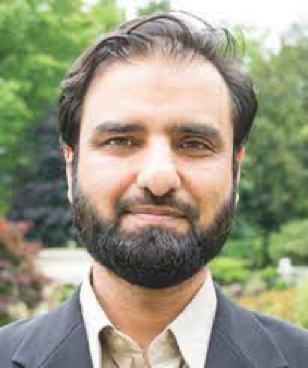
Ovamir Anjum is Imam Khattab Endowed Chair of Islamic Studies at the Department of Philosophy and Religious Studies, University of Toledo. His work focuses on the nexus of theology, ethics, politics and law in classical and medieval Islam, with comparative interest in Western Thought. His interests are united by a common theoretical focus on epistemology or views of intellect/reason in various domains of Islamic thought, ranging from politics (siyasa), law (fiqh), theology (kalam), falsafa (Islamic philosophy) and spirituality (Sufism, mysticism, and asceticism). He brings this historical studies to bear on issues in contemporary Islamic thought and movements and is currently researching developments in Islamic political thought in the wake of the Arab Uprisings of 2011. While trained as an historian, his work is essentially interdisciplinary, drawing on the fields of classical Islamic studies, political philosophy, and cultural anthropology.
He obtained his Ph.D. in Islamic Intellectual history in the Department of History, University of Wisconsin-Madison, Masters in Social Sciences from the University of Chicago and Masters in Computer Science from the University of Wisconsin-Madison. He is the author of Politics, Law and Community in Islamic Thought: The Taymiyyan Moment (Cambridge University Press, 2012). His current projects include one forthcoming edited volume on Islam after the 2011 Arab Uprisings and a monograph on the foundations of modern Islamic political thought. He is also near-completing a decade-long project to translate a popular Islamic spiritual and theological classic, Madarij al-Salikin (Ranks of Divine Seekers) by Ibn al-Qayyim (d. 1351), which, upon completion, would be the largest single-author English translation of a classical Islamic text.
Download Reports
- Report on CILE International Seminar: "The Ethics of Wilāya"
- CILE Public Lecture Report: The ethical duties of wilāya in the Islamic Tradition



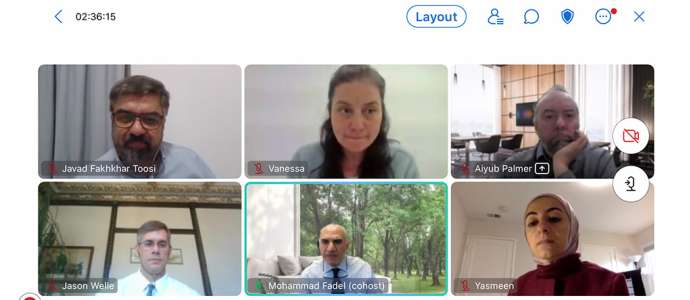


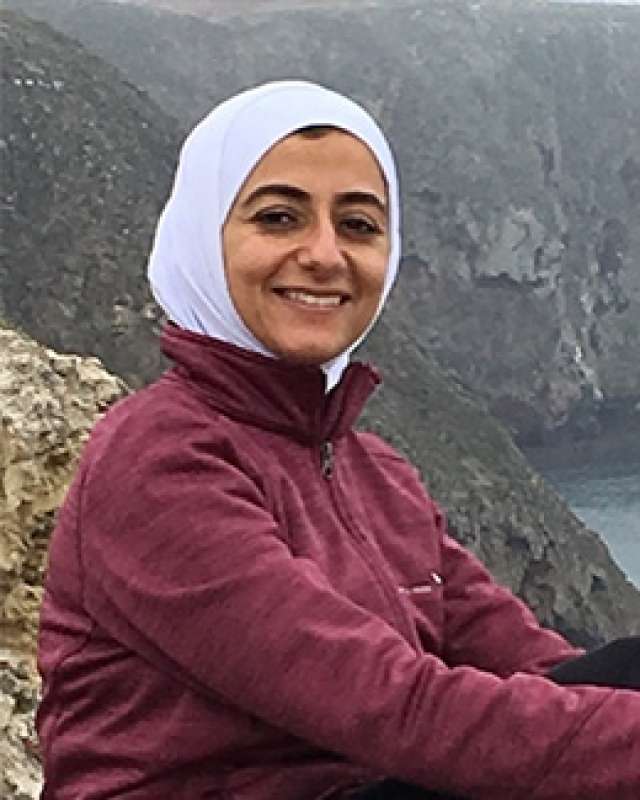
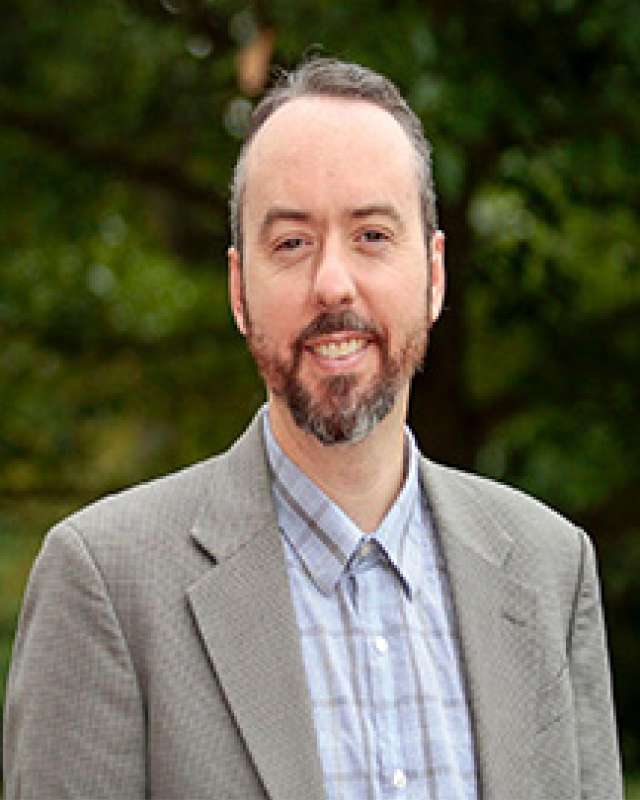
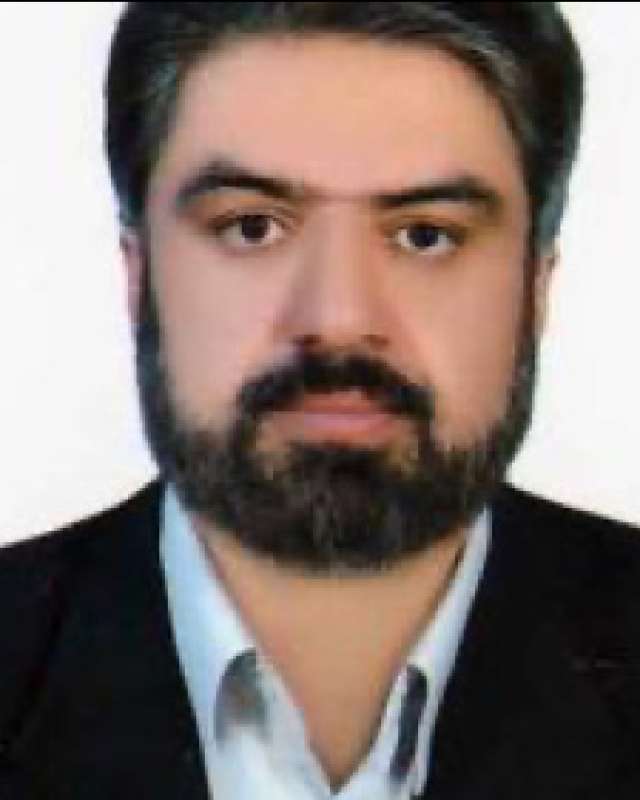
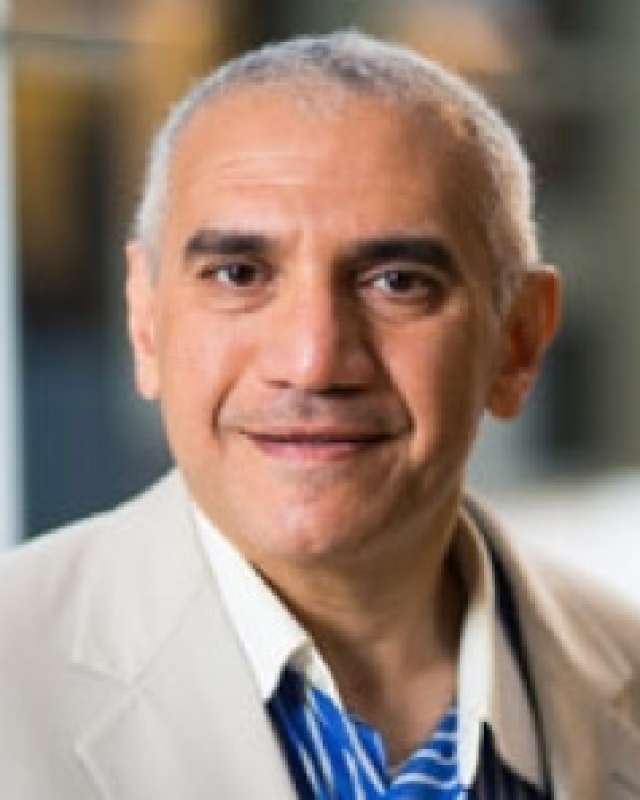



Add new comment